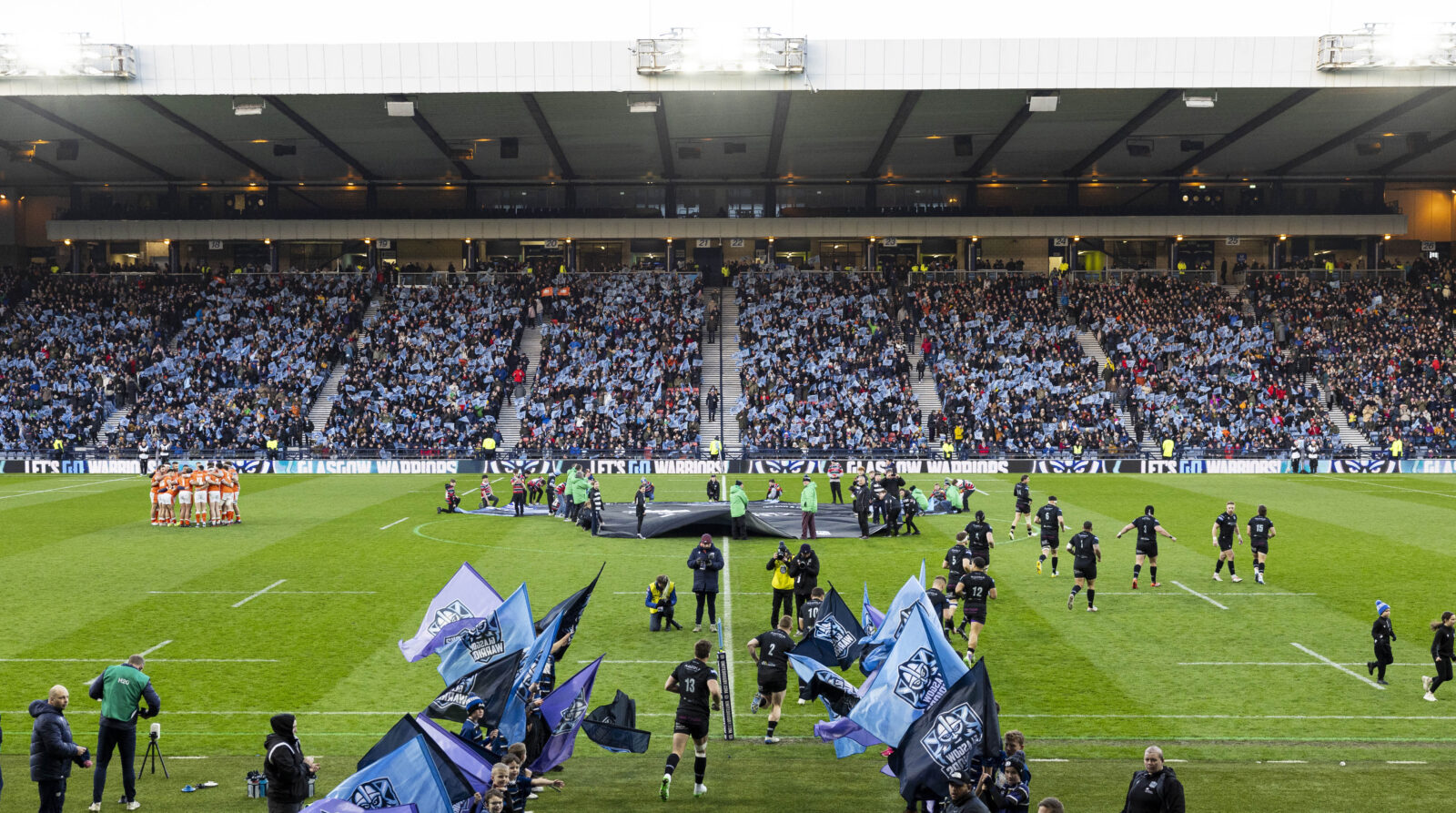HISTORY
Established in 1872 as a district team, Glasgow Warriors has grown beyond recognition to become one of the top professional clubs in Europe.
The Beginning
Glasgow District was founded as one of the four Scottish district sides, alongside North and Midlands, South and Edinburgh. These district sides were not members of the Scottish Rugby Union, however, nor did they have a permanent ground.
Glasgow District was a select provincial amateur rugby union team, drawing players from Greater Glasgow and the west of Scotland. Playing matches against teams from across the world that toured Scotland, the club also competed in the Scottish Inter-District Championship.
1872 Cup
Contested every year between Glasgow Warriors and Edinburgh Rugby, the 1872 Cup reflects the history of Scottish rugby.
The first derby took place on 23 November 1872 when Glasgow District met Edinburgh District at Burnbank, home of Glasgow Academicals RFC. The match – played by teams of 20-a-side – was won by an Edinburgh drop-goal to nil, giving the men from the capital the victory.
The fifteen players that became the first Glasgow District team that day were:
Backs: T Chalmers, W D Brown (both Glasgow Academicals), W Kidston (West of Scotland), W Cross, T Drew (both Glasgow Academicals), G B McClure (West of Scotland), J W Arthur (Glasgow Academicals) (captain).
Forwards – J K Tod, H W Allan, C C Bryce, G R Fleming, J S Thomson, J K Brown (all Glasgow Academicals), J H McClure, J Kennedy, J P Tennant, R Wilson, G Hunter, A Cochrane (all West of Scotland) and J W Reid (Glasgow University).
The game made history as the world’s first inter-district rugby match. Known as the ‘Inter-City’ derby, it was played twice a season until 1876 and became an annual occasion thereafter.
Both of the first two fixtures were won by Edinburgh, with Glasgow having to wait until the 13th inter-city clash to claim victory over their cross-country rivals. On that day in 1881, the victorious Glasgow District side comprised of:
David Kidston (G. Academicals), A. J. W. Reid and C. W. Dunlop (West of Scotland), John Alexander Neilson (West of Scotland) and C. Ker (G. Academicals), D. Y. Cassels [captain], D. McGowan, A. Walker, R. Adam (West of Scotland), R. B. Young, J. Lang (Glasgow University), John Blair Brown, R. A. Kerr, William Andrew Walls, G. H. Robb (G. Academicals).
In 2007/08, it was revived and rebranded by Glasgow Warriors and Edinburgh Rugby as the 1872 Cup. 1872 thus marking the date of the oldest derby match in rugby union history between the original Glasgow and Edinburgh amateur district sides on which the professional clubs were founded
The legacy of the Inter-City derby still continues to this day, as Glasgow Warriors and Edinburgh Rugby do battle each year for the right to lift the prestigious trophy. Nowadays, the 1872 Cup consists of two fixtures between Scotland’s two professional outfits, with the derbies incorporated into the BKT United Rugby Championship schedule.
In December 2024, Glasgow Warriors hosted an 1872 Cup fixture at Hampden Park for the first time, marking the occasion in style by earning a 33-19 victory in front of over 27,500 supporters.
| Season | 1872 Cup Winner |
|---|---|
| 2007/08 | Glasgow Warriors |
| 2008/09 | Edinburgh |
| 2009/10 | Glasgow Warriors |
| 2010/11 | Glasgow Warriors |
| 2011/12 | Glasgow Warriors |
| 2012/13 | Glasgow Warriors |
| 2013/14 | Glasgow Warriors |
| 2014/15 | Edinburgh |
| 2015/16 | Edinburgh |
| 2016/17 | Glasgow Warriors |
| 2017/18 | Edinburgh |
| 2018/19 | Edinburgh |
| 2019/20 | Edinburgh |
| 2020/21 | Glasgow Warriors |
| 2021/22 | Edinburgh |
| 2022/23 | Glasgow Warriors |
| 2023/24 | Glasgow Warriors |
| 2024/25 | Glasgow Warriors |

Professionalism and Glasgow Warriors
In order to compete in the European Cup – the forerunner of the Heineken Champions Cup – Glasgow turned professional in 1996, becoming known as Glasgow Rugby.
Two seasons later, Glasgow Rugby merged with the Caledonia Reds to form Glasgow Caledonians. However, in 2001/02, the team became known once more as Glasgow Rugby, with Caledonians being dropped from the club’s name.
During the same season, the Celtic League was formed. This new cross-border competition included teams from Wales, Ireland and Scotland, and has since developed into the Guinness PRO14. The club finally rebranded as the Glasgow Warriors in the 2005/06 season, with the name remaining until the present day.
Stadium
Originally based at Hughenden in 1996/97, Glasgow Rugby’s merger with the Caledonia Reds led the club to play their matches at a number of venues across the region. Alongside their existing home of Hughenden, Glasgow’s Firhill, McDiarmid Park in Perth and Aberdeen’s Rubislaw Playing Fields were all host venues for Glasgow Caledonians fixtures, consolidating the traditional North and Midlands district.
The following year saw the rotation of venues continue, as Bridgehaugh – the home of Stirling County -, the Caledonian Stadium in Inverness and Ayr’s Millbrae each saw the side run out for a selection of fixtures.
The club returned home for the 2000/01 season, settling at Hughenden until midway through the 2005/06 season. After a brief spell at Firhill, the club returned to Hughenden once more for season 2006/07, before moving permanently to Firhill ahead of 2007/08.
In 2012, Glasgow Warriors moved to their current home at Scotstoun Stadium. Previously the club’s training base, the move has coincided with the most successful period in the club’s history, including a first-ever domestic league title and two Heineken Champions Cup quarter-finals.
In addition to those grounds above, the following stadia have all hosted matches for Glasgow in the professional era: Rugby Park, Kilmarnock; Old Anniesland, Glasgow; Braidholm, Giffnock; Whitecraigs, Newton Mearns; London Road, Stranraer; Burnbrae, Milngavie, North Inch, Perth, Scottish Gas Murrayfield, Edinburgh; and Hampden Park, Glasgow.
Head Coaches
| Head Coach | Period(s) |
|---|---|
| Franco Smith | 2022/23 – present |
| Danny Wilson | 2019/20 – 2021/22 |
| Dave Rennie | 2017/18 – 2019/20 |
| Gregor Townsend | 2012/13 – 2016/17 |
| Sean Lineen | 2006/07 – 2011/12 |
| Hugh Campbell | 2003/04 – 2005/06 |
| Kiwi Searancke | 2002/03 |
| Richie Dixon | 1999/00 – 2001/02 |
| Keith Robertson | 1997/98 – 1998/99 |
| Kevin Greene | 1996/97 |
